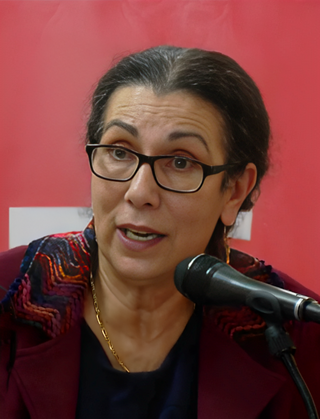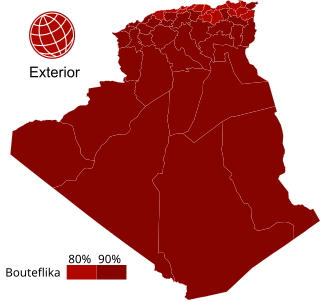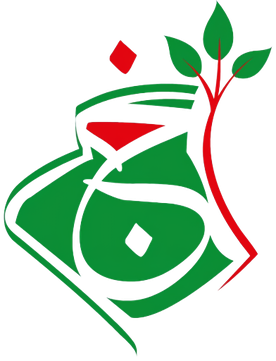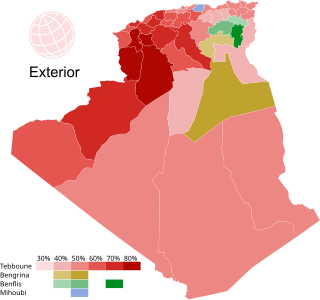
Ahmed Ouyahia is an Algerian politician who was prime minister of Algeria four times. A career diplomat, he also served as Minister of Justice, and he was one of the founders of the Democratic National Rally (RND) as well as the party's secretary-general. He is considered by Western observers to be close to the military of Algeria and a member of the "eradicator" faction in the 1990s civil war against Islamist militants. Ouyahia resigned as prime minister in March 2019 following President Bouteflika's announcement that he would not seek reelection, and Ouyahia was arrested in June 2019 for crimes related to corruption. He was later convicted and is currently serving 19 years in jail.

The Democratic National Rally is a political party in Algeria. The party held its Second Congress on 15–17 May 2003.

The Movement of Society for Peace, sometimes known by its shortened form Hamas, is a Sunni Islamist party in Algeria, led by Mahfoud Nahnah until his death in 2003. Its current leader is Abderrazak Makri. It is an offshoot of the Muslim Brotherhood.

The National Liberation Front, commonly known by its French acronym FLN, is a nationalist political party in Algeria. It was the principal nationalist movement during the Algerian War and the sole legal and ruling political party of the Algerian state until other parties were legalised in 1989.

Louisa Hanoune is the head of Algeria's Workers' Party. In 2004, she became the first woman to run for President of Algeria. Hanoune was imprisoned by the government several times prior to the legalization of political parties in 1988. She was jailed soon after she joined the Trotskyist Social Workers Organisation, an illegal party, in 1981 and again after the 1988 October Riots, which brought about the end of the National Liberation Front's (FLN) single-party rule. During Algeria's civil war of the 1990s, Hanoune was one of the few opposition voices in parliament, and, despite her party's laicist values, a strong opponent of the government's "eradication" policy toward Islamists. In January 1995, she signed the Sant'Egidio Platform together with representatives of other opposition parties, notably the Islamic Salvation Front, the radical Islamist party whose dissolution by military decree brought about the start of the civil war.

Presidential elections were held in Algeria on 8 April 2004. Incumbent President Abdelaziz Bouteflika was re-elected with 85% of the vote.

Abdelaziz Belkhadem is an Algerian politician who was Prime Minister of Algeria from 2006 to 2008. He was also Secretary-General of the National Liberation Front (FLN). Belkhadem served as Minister of Foreign Affairs from 2000 to 2005 and Personal Representative of President Abdelaziz Bouteflika from 2005 to 2006; after serving as Prime Minister from 2006 to 2008, he was again appointed as Personal Representative of the Head of State in 2008.

The Socialist Forces Front is a social democratic and secularist political party, mainly supported by Berbers in Algeria. The FFS is a member of the Socialist International and the Progressive Alliance. It led an unsuccessful rebellion against the Algerian government from 1963 to 1964.

Parliamentary elections were held in Algeria on 5 June 1997. The result was a victory for the National Rally for Democracy (RND), a new party created in early 1997 for President Zéroual's supporters, which won 156 out of 380 seats. They were followed by the Movement of Society for Peace with 69 seats, the National Liberation Front (62), and the Islamist Islamic Renaissance Movement (34). The two Berberist parties, FFS and RCD, got 20 and 19 seats respectively. Views on this election were mixed; most major opposition parties filed complaints, and the success of the extremely new RND raised eyebrows. The RND, FLN, and MSP formed a coalition government, with the RND's Ahmed Ouyahia as prime minister.
The Sant'Egidio Platform of January 13, 1995 was an attempt by most of the major Algerian opposition parties to create a framework for peace and plan to end to the Algerian Civil War. The escalating violence and extremism, which had been provoked by the military's cancellation of the legislative elections in 1991 that the Islamic Salvation Front (FIS), an Islamist party, were expected to win, compelled the major political parties to unite under the auspices of the Catholic Community of Sant'Egidio in Rome. The community had previously played an important role in the drafting of the Rome General Peace Accords in 1992 which ended the civil war in Mozambique. The presence of representatives from the FIS as well as the National Liberation Front (FLN) and Socialist Forces Front (FFS) at these negotiations was extremely significant; the three parties collectively accounted for 80 per cent of the votes in the 1991 election.
General Mohamed Mediène, also known as Toufik (توفيق), is an Algerian intelligence officer who formerly served as head of the country's secret services, the Intelligence and Security Department, from 1990 to 2015. He was described as the world's longest serving "intelligence chief".

Parliamentary elections were held in Algeria on 17 May 2007. 24 political parties and around 100 independent lists with a total of more than 12,000 candidates competed for the 389 seats in the National People's Assembly. While most Algerians voted on May 17, immigrants from Algeria to other countries and Algerians living in the Sahara and other nomads and semi-nomads voted on May 16 due to the distance from Algiers, the country's capital.

Parliamentary elections were held in Algeria on 30 May 2002 to elect members of the People's National Assembly. The governing National Liberation Front (FLN) won a majority of seats in the election. The election suffered from a low turnout, violence and boycotts by some opposition parties.

Presidential elections were held in Algeria on 9 April 2009. The result was a victory for incumbent President Abdelaziz Bouteflika, who was re-elected with 90% of the vote.
Events from the year 2012 in Algeria

The Green Algeria Alliance, short Green Alliance was an Islamist coalition of political parties, created on 7 March 2012 for the Algerian legislative election, 2012. It consisted of the Movement of Society for Peace (Hamas), Islamic Renaissance Movement (Ennahda) and the Movement for National Reform (Islah). The alliance was led by Bouguerra Soltani of the Hamas.

Presidential elections were held in Algeria on 17 April 2014. Incumbent President Abdelaziz Bouteflika was re-elected with 82% of the vote. Issues in the campaign included a desire for domestic stability after the bloody civil war of the 1990s, the state of the economy, the frail health of 77-year-old president Abdelaziz Bouteflika who had been in power for fifteen years, and whose speech was "slurred and inaudible" in his only public outing during the campaign, and the less-than-wholehearted support given the president by the normally united and discrete ruling class.

Presidential elections were held in Algeria on 12 December 2019. The election had originally been scheduled for 18 April, but was postponed due to sustained weekly protests against plans by the incumbent president Abdelaziz Bouteflika to run for a fifth term. Bouteflika resigned on 2 April and Abdelkader Bensalah was elected acting president by parliament a week later. On 10 April the election was rescheduled for 4 July. On 2 June the Constitutional Council postponed the elections again, citing a lack of candidates. A new electoral authority, Autorité nationale indépendante des élections (ANIE), was created in mid-September as an alternative to the existing Haute instance indépendante de surveillance des élections (HIISE) defined by the 2016 constitution. The election was rescheduled for 12 December 2019 and ANIE, of disputed constitutional validity, announced five valid candidates on 2 November. In their 200000 strong protest on 1 November, Algerian protestors rejected the 12 December election and called for a radical change in the system to take place first. The Forces of the Democratic Alternative (FDA) alliance and the Justice and Development Front also called for boycotting the 12 December election, and the FDA called for creating a constituent assembly.

The 2019–2021 Algerian protests, also called Revolution of Smiles or Hirak, began on 16 February 2019, six days after Abdelaziz Bouteflika announced his candidacy for a fifth presidential term in a signed statement. These protests, without precedent since the Algerian Civil War, were peaceful and led the military to insist on Bouteflika's immediate resignation, which took place on 2 April 2019. By early May, a significant number of power-brokers close to the deposed administration, including the former president's younger brother Saïd, had been arrested.
Saïd Bouteflika is an Algerian politician and academic. He is the brother and was a special adviser of Abdelaziz Bouteflika in his former role as President of Algeria, on whom he would have had "considerable influence", especially after the president suffered a serious stroke in 2013. He was also an assistant professor at the University of Science and Technology Houari Boumediene (USTHB).





















